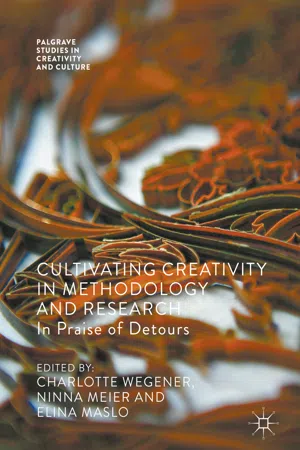How can I know what I think until I see what I say?

Cultivating Creativity in Methodology and Research
In Praise of Detours
- English
- ePUB (mobile friendly)
- Available on iOS & Android
Cultivating Creativity in Methodology and Research
In Praise of Detours
About This Book
This book presents a variety of narratives on key elements of academic work, from data analysis, writing practices and engagement with the field. The authors discuss how elements of academic work and life – usually edited out of traditional research papers – can elicit important analytical insight. The book reveals how the unplanned, accidental and even obstructive events that often occur in research life, the 'detours', can potentially glean important results.
The authors introduce the process of 'writing-sharing-reading-writing' as a way to expand the playground of research and inspire a culture in which 'accountable' research methodologies involve adventurousness and an element of uncertainty. Written by scholars from a range of different fields, academic levels and geographic locations, this unique book will offer significant insight to those from a range of academic fields.
Frequently asked questions
Information
1. Editors’ Introduction: The Power of ‘Showing How It Happened’
Table of contents
- Cover
- Frontmatter
- 1. Editors’ Introduction: The Power of ‘Showing How It Happened’
- 1. Different Vantage Points, New Insights
- 2. Research Life: Life and Research
- 3. How We Know: Making Sense of Methods and Field Work
- 4. Coping with Complexity: Writing to Understand What We Do
- Backmatter